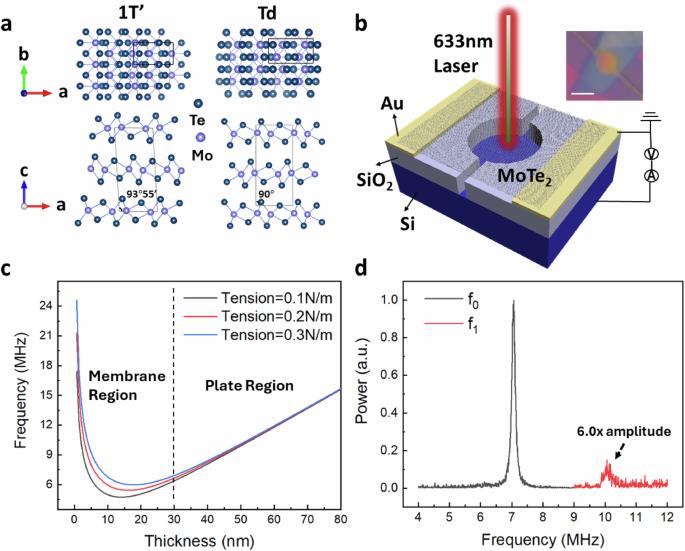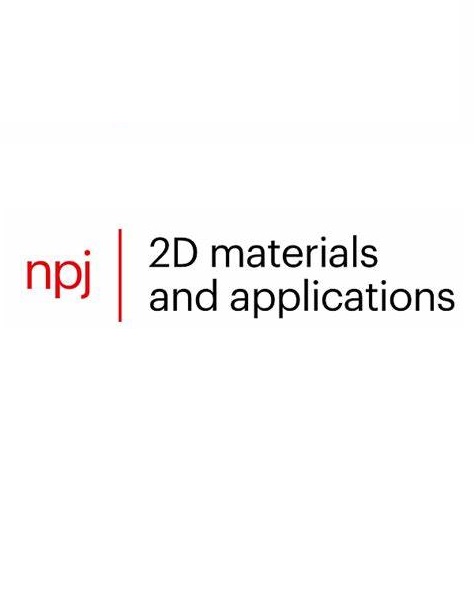Revealing stacking order transition via nanomechanical resonator
IF 8.8
2区 材料科学
Q1 MATERIALS SCIENCE, MULTIDISCIPLINARY
引用次数: 0
Abstract
The physical properties of two-dimensional (2D) van der Waals (vdW) materials are profoundly influenced by their stacking orders, which affect interlayer coupling and crystal symmetry, leading to fascinating strongly correlated orders. Detecting stacking orders is important, yet challenging as they involve sub-nanometer shifts in the relative arrangement of layers. In this study, we utilize nanomechanical resonators to detect the strain change during the stacking order transition of octahedrally coordinated thin molybdenum ditelluride (MoTe2) membranes and show the change in stacking orders can be reflected by the vibration modes of nanomechanical resonators. We discover that a strain as small as 0.014%—induced by transitions in the stacking order—results in a notable frequency shift up to 1.019 MHz in the mechanical resonance. We establish the relationship between the detection sensitivity of stacking orders and both internal and external parameters including higher-order vibrations, electrostatic energy, and initial strain. Our nanomechanical methodology offers a potential avenue for creating a comprehensive phase diagram by uncovering stacking orders across a wide array of van der Waals materials and leveraging ultralow-barrier stacking order transitions for energy-efficient devices.

通过纳米机械谐振器揭示堆积阶转变
二维(2D)范德华(vdW)材料的物理性质深受堆积阶的影响,堆积阶会影响层间耦合和晶体对称性,从而产生令人着迷的强相关阶。堆积阶的检测非常重要,但也极具挑战性,因为它们涉及层间相对排列的亚纳米级移动。在这项研究中,我们利用纳米机械共振器来检测八面体配位薄层二碲化钼(MoTe2)膜在堆积阶转变过程中的应变变化,结果表明堆积阶的变化可以通过纳米机械共振器的振动模式反映出来。我们发现,由堆积阶变化引起的小至 0.014% 的应变会导致机械共振出现高达 1.019 MHz 的显著频率偏移。我们建立了堆积阶检测灵敏度与内部和外部参数(包括高阶振动、静电能量和初始应变)之间的关系。我们的纳米机械方法通过揭示各种范德华材料的堆积阶次,以及利用超低势垒堆积阶次转换实现高能效设备,为创建全面的相图提供了潜在的途径。
本文章由计算机程序翻译,如有差异,请以英文原文为准。
求助全文
约1分钟内获得全文
求助全文
来源期刊

npj 2D Materials and Applications
Engineering-Mechanics of Materials
CiteScore
14.50
自引率
2.10%
发文量
80
审稿时长
15 weeks
期刊介绍:
npj 2D Materials and Applications publishes papers on the fundamental behavior, synthesis, properties and applications of existing and emerging 2D materials. By selecting papers with the potential for impact, the journal aims to facilitate the transfer of the research of 2D materials into wide-ranging applications.
 求助内容:
求助内容: 应助结果提醒方式:
应助结果提醒方式:


